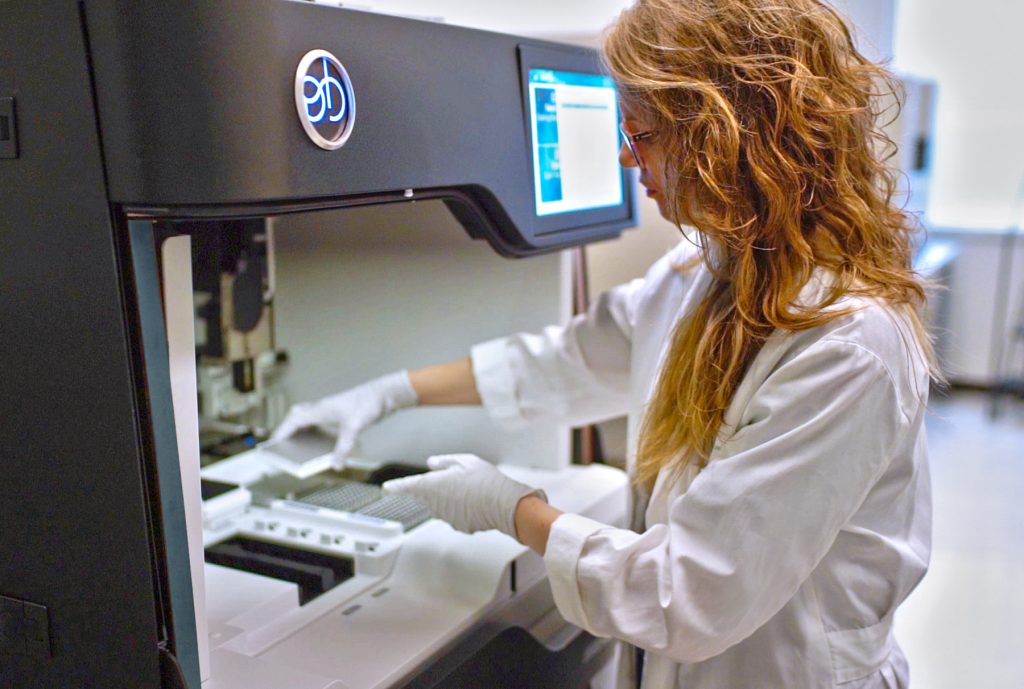New research into the effectiveness of antibiotics in space may also help scientists determine how to defeat antibiotic-resistant bacteria here on Earth
Huntsville, Ala. — HudsonAlpha Faculty Investigator Shawn Levy, Ph.D., and the HudsonAlpha Genomic Services Lab will soon be analyzing samples of antibiotic-resistant bacteria that returned from space this weekend onboard the SpaceX Dragon capsule.
The capsule carrying the samples and more than 3,000 pounds of other cargo and science experiments splashed down in the Pacific Ocean Saturday, Oct. 25. The samples will arrive at HudsonAlpha this week and begin processing immediately.
The Antibiotic Effectiveness in Space experiment has been onboard the National Lab of the International Space Station since January. The experiment is a partnership between HudsonAlpha and BioServe Space Technologies, a NASA-funded center in the University of Colorado at Boulder’s aerospace engineering sciences department.
The Genomic Services Lab at HudsonAlpha will be sequencing the genome and transcriptomes – that is all of the DNA and all of the RNA – of the bacterial samples and analyzing the data to determine any changes in gene expression, or gene activity level, and possible mutations that could be associated with the antibiotic resistance. Luis Zea, a graduate student in Bioastronautics with BioServe and the University of Colorado at Boulder will work directly with the HudsonAlpha team to transfer the samples from their space flight hardware to standard lab hardware.
“The rapid changes in how bacteria respond to antibiotics are not well understood,” said Levy, Director of the Genomic Services Lab. “This collaboration between HudsonAlpha and BioServe Space Technologies will allow us to examine bacterial response to antibiotics at the genome scale and hopefully advance our understanding of the mechanisms that bacteria use to rapidly respond to antibiotics and develop resistance.”
Bacterial resistance to antibiotics kills approximately 100,000 Americans every year. According to the Centers for Disease Control and Prevention, antibiotic resistance is one of the world’s most pressing public health problems.
Principal investigator on the project, CU-Boulder Associate Professor David Klaus, said past experiments have shown bacterial susceptibility to antibiotics is significantly reduced during spaceflight, although the reason is not yet known.
The investigation will examine changes in gene expression of the bacteria E. coli during exposure to different concentrations of antibiotics while in the microgravity environment of space. E. coli is often used in microgravity studies because it is one of several bacteria that grow more rapidly in space than on Earth.
Scientists hope to locate particular genes that are key to resisting antibiotics, which could lead to improved testing on Earth as well as new drug targets or new approaches to understanding antibiotic resistance in certain diseases or infections.
Under Levy’s direction, the Genomic Services Lab offers cutting-edge genetic research tools to both academic and commercial customers, primarily specializing in sequencing technologies, but also offering microarray, epigenetic, and RT-PCR services.
About HudsonAlpha: HudsonAlpha Institute for Biotechnology is a nonprofit institute dedicated to innovating in the field of genomic technology and sciences across a spectrum of biological challenges. Founded in 2008, its mission is four-fold: sparking scientific discoveries that can impact human health and well-being; bringing genomic medicine into clinical care; fostering life sciences entrepreneurship and business growth; and encouraging the creation of a genomics-literate workforce and society. The HudsonAlpha biotechnology campus consists of 152 acres nestled within Cummings Research Park, the nation’s second largest research park. Designed to be a hothouse of biotech economic development, HudsonAlpha’s state-of-the-art facilities co-locate nonprofit scientific researchers with entrepreneurs and educators. The relationships formed on the HudsonAlpha campus encourage collaborations that produce advances in medicine and agriculture. Under the leadership of Dr. Richard M. Myers, a key collaborator on the Human Genome Project, HudsonAlpha has become a national and international leader in genetics and genomics research and biotech education, and includes 30 diverse biotech companies on campus. To learn more about HudsonAlpha, visit: http://hudsonalpha.org/.
Media Contact
Margetta Thomas
256-327-0425
mthomas@hudsonalpha.org

